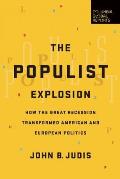 If you’re a little unsettled by the changing nature of politics at home and abroad you’re not alone. We often see current events in isolation, yet sometimes there is a deep connection between them. Donald Trump, Bernie Sanders, Brexit, Barack Obama, the Tea Party, Occupy… could there BE any one unifying factor? In this month’s book spotlight, John Judis makes a powerful argument that there is, and we’re only
If you’re a little unsettled by the changing nature of politics at home and abroad you’re not alone. We often see current events in isolation, yet sometimes there is a deep connection between them. Donald Trump, Bernie Sanders, Brexit, Barack Obama, the Tea Party, Occupy… could there BE any one unifying factor? In this month’s book spotlight, John Judis makes a powerful argument that there is, and we’re only  seeing the beginning of it. Click the link to go to the Powells.com site for the book, and pick up the thread for yourself…
seeing the beginning of it. Click the link to go to the Powells.com site for the book, and pick up the thread for yourself…
“The Populist Explosion”
by John B. Judis
Review from Columbia Global Reports
What’s happening in global politics, and is there a thread that ties it all together? There is, and it is called populism.
In the spring and summer of 2016, the world’s richest democracies witnessed a collective upheaval that shocked the globe and seemed impossible to understand. As if overnight, many Democrats revolted and passionately backed a socialist named Bernie Sanders; the United Kingdom voted to leave the European Union, in a stunning rebuke; the vituperative billionaire Donald Trump became the presidential nominee of the Republican Party; and a slew of rebellious parties continued to win election after election in countries like Switzerland, Norway, Italy, Austria, and Greece.
John B. Judis, one of America’s most respected political analysts, tells us why we need to learn about the populist movement that began in the United States in the 1890s and whose politics have recurred on both sides of the Atlantic ever since. Populism cannot be defined in terms of right, left, or center. It champions the people against an establishment, based on issues—these days, globalization, free trade, and immigration—on which there has been a strong elite consensus, but, obviously, an even stronger mass discontent that is now breaking out into the open. The political system is only just beginning what will be a long-running and highly consequential readjustment.
Based on extensive travels in the U.S., Spain, France, and Denmark, and on interviews with political experts across the Atlantic, The Populist Explosion is essential reading for anyone hoping to grasp the forces that are altering the course of history, written by a brilliant observer who has long seen the change coming.
Book Spotlight Bonus!
Most of the books in our Book Spotlight are available for checkout in our Book and Bumper Sticker Library in our lobby. If you see a book that interests you on your next visit, just tell your Service Advisor you’d like to borrow it and then bring it back on your next visit. You can also help yourself to one of our free magnetic bumper stickers or free DVDs on a variety of subjects.  You have to admit, that’s a pretty open-access lending policy, much easier than the one they had back in the Middle Ages…
You have to admit, that’s a pretty open-access lending policy, much easier than the one they had back in the Middle Ages…
Protect Your Library the Medieval Way, With Horrifying Book Curses by Sarah Laskow on Atlas Obscura, Nov 2016
In the Middle Ages, creating a book could take years. A scribe would bend over his copy table, illuminated only by natural light—candles were too big a risk to the books—and spend hours each day forming letters, by hand, careful never to make an error. To be a copyist, wrote one scribe, was painful: “It extinguishes the light from the eyes, it bends the back, it crushes the viscera and the ribs, it brings forth pain to the kidneys, and weariness to the whole body.”
Given the extreme effort that went into creating books, scribes and book owners had a real incentive to protect their work. They used the only power they had: words. At the beginning or the end of books, scribes and book owners would write dramatic curses threatening thieves with pain and suffering if they were to steal or damage these treasures.
They did not hesitate to use the worst punishments they knew—excommunication from the church and horrible, painful death. Steal a book, and you might be cleft by a demon sword, forced to sacrifice your hands, have your eyes gouged out, or end in the “fires of hell and brimstone.”
“These curses were the only things that protected the books,” says Marc Drogin, author of Anathema! Medieval Scribes and the History of Book Curses. “Luckily, it was in a time where people believed in them. If you ripped out a page, you were going to die in agony. You didn’t want to take the chance…”











